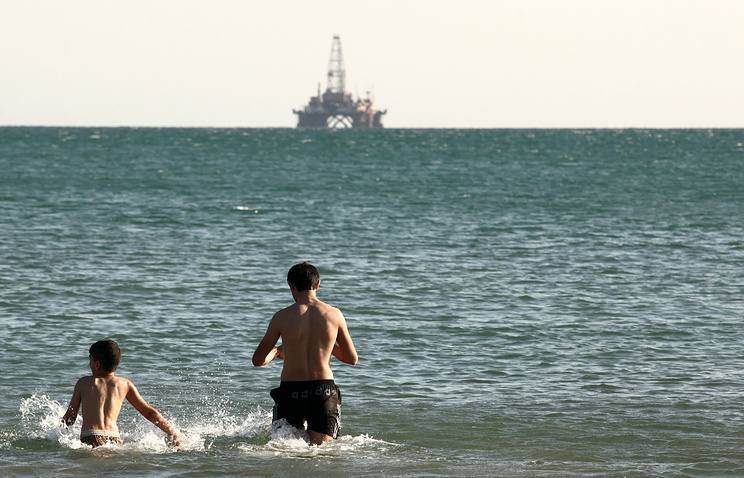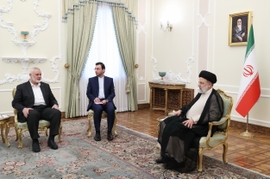After more than 20 years of debate between the governments of the five Caspian Sea littoral states over the status of what is the world’s largest lake, its legal status and how its waters should be partitioned are expected to be resolved next month. But the Moscow-based Zarubezhneft energy company, which is engaged in oil and gas exploration, is not going to wait for the final decision.
Zarubezhneft, which is active in Vietnam, Cuba and Jordan, announced its intent to shut down its branch in Turkmenistan, according to a report by Chronicles of Turkmenistan. Russia’s state-owned company has already carried out a tender in a bid to organize the process of disbanding its office in Ashgabat.
According to the annual report of Zarubezhneft, “Turkmenistan ceased to be a country of potential interest for the company.”
Turkmenistan has the world’s sixth largest proven natural gas reserves, or roughly 7.5 trillion cubic meters, while its estimated oil reserves are nearly 600 million barrels. With a small domestic market – there are about 5.3 million inhabitants – the country has become the world’s seventh largest exporter of natural gas, according to U.S. government statistics. Researchers have discovered about 180 energy deposits in the country of which just one third are under development.
Together with Russia’s oil giant Rosneft and Itera (now Areti International Group), Zarubezhneft tried to join oil and gas projects in the southern part of the Caspian Sea since 2001. The companies launched a joint venture dubbed ZARIT. For over 10 years, Russian oil giants tried to ink a Product Sharing Agreement (PSA) with Turkmenistan’s authorities, but due to the debates over offshore oil and gas fields between the Caspian Sea littoral states, the PSA never came to fruition and the activities of ZARIT were halted. In 2015, Rosneft and Zarubezhneft announced the bankruptcy of the joint venture.
As the world’s largest inland body of water, the Caspian Sea is bordered in the northeast by Kazakhstan, in the southeast by Turkmenistan, in the south by Iran, in the southwest by Azerbaijan, and in the northwest by Russia. It was once an internal reservoir of the Soviet Union, when only 13.8 percent of the sea belonged to Iran. Following the collapse of the USSR in 1991, the number of Caspian states increased to five – and debates began as to which countries own what parts.
While oil and gas deposits beneath its waters are plentiful, the sea has long been famous for its sturgeon – a fish prized for its caviar, for which the Caspian Sea accounts for most of the world’s catch. Petroleum and natural gas reservoirs are now sought after because they bring in money for state coffers, especially as Europe is looking to diversify its energy markets and China is looking westward for resources to feed its growing economy.
The most promising reserves lie under the northeastern Caspian and its adjacent shores. It is estimated that the sea contains 48 billion barrels of oil and 8.7 trillion cubic meters of gas in proven or probable reserves.
The exploration of the Caspian is still regulated by the Soviet-Iranian treaties, which provide for free navigation and fishing, but do not regulate the issues of subsoil use, military activities, transit through the sea, nor protection of the natural environment.
Since 2002, the five countries have been trying to compromise, but views differ on how to delineate the bottom of the sea, beneath which the energy deposits lie.
The littoral dispute may be resolved on August 12, when the leaders of the five countries will meet in Aktau, Kazakhstan to discuss the Draft Convention on the Legal Status of the Caspian. The agreement is designed to legitimize access to oil, gas and fish, which was adopted by Russia’s President Vladimir Putin on June 29.
Late last year, following the meeting of the Foreign Ministers of the “Caspian Five” held in Moscow, Russia’s Foreign Minister Sergey Lavrov said participants agreed on all the key provisions of the convention, and that “in fact, the text of the convention is ready.”
“This time, according to the signals that come from the negotiators, the convention, which was agreed upon for 22 years, is likely to be signed – we can see this from Lavrov’s statement,” said Stanislav Pritchin, head of the analytical group at the Russian Academy of Sciences, according to reports by Gazeta.Ru.
“The Convention will outline the basic principles of cooperation of the five states on the Caspian Sea,” he added.







 The Islamic holy month of fasting, Ramadan comes to an end this week with the celebration of a joyous festival called Eid (meaning “festival” in Ar...
The Islamic holy month of fasting, Ramadan comes to an end this week with the celebration of a joyous festival called Eid (meaning “festival” in Ar...
 Iranian Foreign Ministry Spokesperson Nasser Kanani warned of “geopolitical rivalries”, commenting on a recent high-level meeting between Armenia, ...
Iranian Foreign Ministry Spokesperson Nasser Kanani warned of “geopolitical rivalries”, commenting on a recent high-level meeting between Armenia, ...
 Iran's President Ebrahim Raisi extended condolences to the Chairman of the Political Bureau of the Palestinian Hamas group, Ismail Haniyeh, followi...
Iran's President Ebrahim Raisi extended condolences to the Chairman of the Political Bureau of the Palestinian Hamas group, Ismail Haniyeh, followi...



